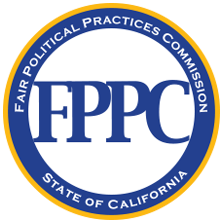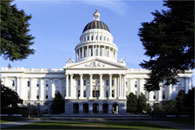September 24, 2018 •
California Bans Cryptocurrency Campaign Contributions
On September 20, the Fair Political Practices Commission prohibited the use of cryptocurrency in political contributions in California. The FPPC stated the anonymity of these donations would make it difficult to discern who is attempting to influence elections. This is […]
 On September 20, the Fair Political Practices Commission prohibited the use of cryptocurrency in political contributions in California.
On September 20, the Fair Political Practices Commission prohibited the use of cryptocurrency in political contributions in California.
The FPPC stated the anonymity of these donations would make it difficult to discern who is attempting to influence elections.
This is contrary to the position the Federal Election Commission took in 2014, which said cryptocurrencies are in-kind property and federal candidates could accept them as a form of contribution under certain conditions.
August 10, 2018 •
California FPPC to Consider Use of Cryptocurrency for Campaign Purposes
The Fair Political Practices Commission is considering changes to state campaign finance regulations. The commission was asked to consider the permissible use of cryptocurrency, such as Bitcoin, for campaign contributions and expenditures. Though similar to cash, such currency is not […]
 The Fair Political Practices Commission is considering changes to state campaign finance regulations.
The Fair Political Practices Commission is considering changes to state campaign finance regulations.
The commission was asked to consider the permissible use of cryptocurrency, such as Bitcoin, for campaign contributions and expenditures. Though similar to cash, such currency is not issued by a governmental entity.
Issues expected to be discussed at a public hearing include banning the use of cryptocurrency for campaign purposes, limiting cryptocurrency contributions to the amount of contributions received in cash, requiring cryptocurrency contributions to be converted to cash, permitting committees to establish separate cryptocurrency accounts, or permitting cryptocurrency contributions as in-kind contributions without regard to cash limits.
A public hearing will be held September 20, 2018; written comments should be received by September 18.
July 24, 2018 •
Gov. Jerry Brown Appoints New FPPC Chair
Alice Germond was appointed chairwoman of the California Fair Political Practices Commission last month. Germond and the commissioners are working to boost voter trust in the commission “so that they have faith when they go to the election booth that […]
 Alice Germond was appointed chairwoman of the California Fair Political Practices Commission last month.
Alice Germond was appointed chairwoman of the California Fair Political Practices Commission last month.
Germond and the commissioners are working to boost voter trust in the commission “so that they have faith when they go to the election booth that their vote is not bought and that the playing field is level and that the basic part of democracy is working for them.”
Germond will be the chair until January, when the newly-elected governor will have the option to appoint a new chairperson.
Under a California bill introduced on February 6, registered lobbyists could face suspension up to four years if found to have committed an act of sexual harassment. Assembly Bill 2055 requires the Fair Political Practices Commission to investigate sexual harassment […]
 Under a California bill introduced on February 6, registered lobbyists could face suspension up to four years if found to have committed an act of sexual harassment.
Under a California bill introduced on February 6, registered lobbyists could face suspension up to four years if found to have committed an act of sexual harassment.
Assembly Bill 2055 requires the Fair Political Practices Commission to investigate sexual harassment complaints made against registered lobbyists.
Sexual harassment would be defined as unwelcome sexual advances, requests for sexual favors, and other verbal, visual, or physical conduct of a sexual nature that arises out of or in the course of employment.
October 12, 2017 •
California Governor Signs Two Campaign Finance Bills
On Tuesday, Gov. Jerry Brown signed Senate Bill 267 and Senate Bill 358 into law. Senate Bill 267 authorizes the Fair Political Practices Commission to have primary responsibility for the impartial, administration, implementation, and enforcement of a local campaign finance […]
 On Tuesday, Gov. Jerry Brown signed Senate Bill 267 and Senate Bill 358 into law.
On Tuesday, Gov. Jerry Brown signed Senate Bill 267 and Senate Bill 358 into law.
Senate Bill 267 authorizes the Fair Political Practices Commission to have primary responsibility for the impartial, administration, implementation, and enforcement of a local campaign finance reform of the city of Sacramento, effective immediately.
Senate Bill 358 requires the secretary of state’s website to post hyperlinks to the website of any local government agency containing publicly disclosed campaign finance information.
August 28, 2017 •
California Disclose Act Gets Closer to Passage
Assembly Bill 249, also known as the “California Disclose Act,” will be heard in the Senate on August 29. The bill requires most campaign ads to display their top three funders, even if those contributions were funneled through other committees. […]
 Assembly Bill 249, also known as the “California Disclose Act,” will be heard in the Senate on August 29. The bill requires most campaign ads to display their top three funders, even if those contributions were funneled through other committees.
Assembly Bill 249, also known as the “California Disclose Act,” will be heard in the Senate on August 29. The bill requires most campaign ads to display their top three funders, even if those contributions were funneled through other committees.
Similar versions of AB 249 have been introduced without passage since 2012. A similar bill from 2016 failed by one vote in the Senate. Last year’s bill was opposed by the California Fair Political Practice Commission (FPPC) due to the bill’s language making enforcement difficult.
The current version of the bill underwent changes to make the proposed law more acceptable to opponents and the FPPC has remained neutral.
August 17, 2017 •
FPPC Votes to Change Recall Election Campaign Finance Rule
On August 17, the Fair Political Practices Commission (FPPC) voted to reverse a longstanding rule that limited how much money politicians and their committees can give to a candidate-controlled recall committee. The 2002 FPPC opinion that was reversed by today’s […]
 On August 17, the Fair Political Practices Commission (FPPC) voted to reverse a longstanding rule that limited how much money politicians and their committees can give to a candidate-controlled recall committee.
On August 17, the Fair Political Practices Commission (FPPC) voted to reverse a longstanding rule that limited how much money politicians and their committees can give to a candidate-controlled recall committee.
The 2002 FPPC opinion that was reversed by today’s vote limited politician contributions to candidate-controlled recall committees to $4,400.
The rule change now allows politicians to give unlimited amounts of money to help fight the recall of Democratic Senator Josh Newman.
Chair Jodi Remke was the only dissenting commissioner in the 3-1 final vote.
On March 16, California’s Fair Political Practices Commission (FPPC) held a hearing on the possible adoption of a regulation to change the test for when a candidate controls a political committee. Leaders of the Democratic and Republican caucuses of the […]
 On March 16, California’s Fair Political Practices Commission (FPPC) held a hearing on the possible adoption of a regulation to change the test for when a candidate controls a political committee.
On March 16, California’s Fair Political Practices Commission (FPPC) held a hearing on the possible adoption of a regulation to change the test for when a candidate controls a political committee.
Leaders of the Democratic and Republican caucuses of the state Senate and Assembly oppose the proposed regulation as creating a vague and uncertain test for whether a committee is controlled by a candidate.
One of the most contested features of the regulation is a provision that would determine a candidate controls a committee if the candidate raises an “extensive” amount of money for the committee.
FPPC staff decided to take legislators’ concerns into consideration, delaying action on the proposed regulation until next month to allow time for changes.
November 22, 2016 •
FPPC Approves Amendments to Increase Gift and Campaign Contribution Limits
On Nov. 17, California’s Fair Political Practices Commission (FPPC) approved regulations to make biennial cost of living adjustments to campaign contribution and gift limits that will apply from Jan. 1, 2017, through Dec. 31, 2018. The newly amended regulations change […]
 On Nov. 17, California’s Fair Political Practices Commission (FPPC) approved regulations to make biennial cost of living adjustments to campaign contribution and gift limits that will apply from Jan. 1, 2017, through Dec. 31, 2018.
On Nov. 17, California’s Fair Political Practices Commission (FPPC) approved regulations to make biennial cost of living adjustments to campaign contribution and gift limits that will apply from Jan. 1, 2017, through Dec. 31, 2018.
The newly amended regulations change the gift limit from $460 to $470 and makes increases to campaign contribution limits.
October 21, 2016 •
FPPC Approves Amendment Affecting Nonprofit Reporting
On October 20, California’s Fair Political Practices Commission (FPPC) approved a regulation to provide further direction on how nonprofit organizations should report donor names relating to travel payments. The regulation creates Form 807 for the purpose of disclosing donor […]

On October 20, California’s Fair Political Practices Commission (FPPC) approved a regulation to provide further direction on how nonprofit organizations should report donor names relating to travel payments.
The regulation creates Form 807 for the purpose of disclosing donor information of nonprofits that regularly organize and host travel for elected officials. The regulation will become effective 30 days after the FPPC files it with the Office of the Secretary of State.
On November 17, the Fair Political Practices Commission (FPPC) will consider proposed regulations to make biennial cost of living adjustments to campaign contribution and gift limits that will apply from January 1, 2017 through December 31, 2018. The proposed regulations […]
 On November 17, the Fair Political Practices Commission (FPPC) will consider proposed regulations to make biennial cost of living adjustments to campaign contribution and gift limits that will apply from January 1, 2017 through December 31, 2018.
On November 17, the Fair Political Practices Commission (FPPC) will consider proposed regulations to make biennial cost of living adjustments to campaign contribution and gift limits that will apply from January 1, 2017 through December 31, 2018.
The proposed regulations would change the gift limit from $460 to $470 and make increases to campaign contribution limits.
The FPPC is accepting written comments on the proposals until November 15, 2016.
September 22, 2016 •
First Reports Under California’s New Lobbyist Reporting Requirements Due October 31
The first reports under the Fair Political Practices Commission’s new amended reporting requirements for “other payments to influence legislative or administrative action” are due October 31. The third quarter report covers the period of July 1 to September 30, 2016. […]
 The first reports under the Fair Political Practices Commission’s new amended reporting requirements for “other payments to influence legislative or administrative action” are due October 31.
The first reports under the Fair Political Practices Commission’s new amended reporting requirements for “other payments to influence legislative or administrative action” are due October 31.
The third quarter report covers the period of July 1 to September 30, 2016.
Lobbyist employers and persons spending $5,000 or more to influence legislative or administrative action will need to itemize “other payments to influence legislative or administrative action” using the new Form 640.
September 12, 2016 •
California’s FPPC Proposes Regulation Affecting Nonprofits
On October 20, California’s Fair Political Practices Commission (FPPC) will consider a proposed regulation to provide further direction on how nonprofit organizations should report donor names relating to travel payments. The proposed regulation would create Form 807 for the purpose […]
 On October 20, California’s Fair Political Practices Commission (FPPC) will consider a proposed regulation to provide further direction on how nonprofit organizations should report donor names relating to travel payments.
On October 20, California’s Fair Political Practices Commission (FPPC) will consider a proposed regulation to provide further direction on how nonprofit organizations should report donor names relating to travel payments.
The proposed regulation would create Form 807 for the purpose of disclosing donor information of nonprofits that regularly organize and host travel for elected officials.
The FPPC is accepting written comments on the proposal until October 18, 2016.
July 22, 2016 •
FPPC Approves Amendment to Lobbyist Regulation
On July 21, California’s Fair Political Practices Commission (FPPC) approved a regulation to further clarify the definition of “lobbyist.” The regulation creates a rebuttable presumption that all compensation from a person for services that include direct communication with a qualifying […]
 On July 21, California’s Fair Political Practices Commission (FPPC) approved a regulation to further clarify the definition of “lobbyist.”
On July 21, California’s Fair Political Practices Commission (FPPC) approved a regulation to further clarify the definition of “lobbyist.”
The regulation creates a rebuttable presumption that all compensation from a person for services that include direct communication with a qualifying official for the purpose of influencing legislative or administrative action received within a calendar month is for the purpose of direct compensation.
The regulation will become effective 30 days after the FPPC files it with the Office of the Secretary of State.
State and Federal Communications, Inc. provides research and consulting services for government relations professionals on lobbying laws, procurement lobbying laws, political contribution laws in the United States and Canada. Learn more by visiting stateandfed.com.

